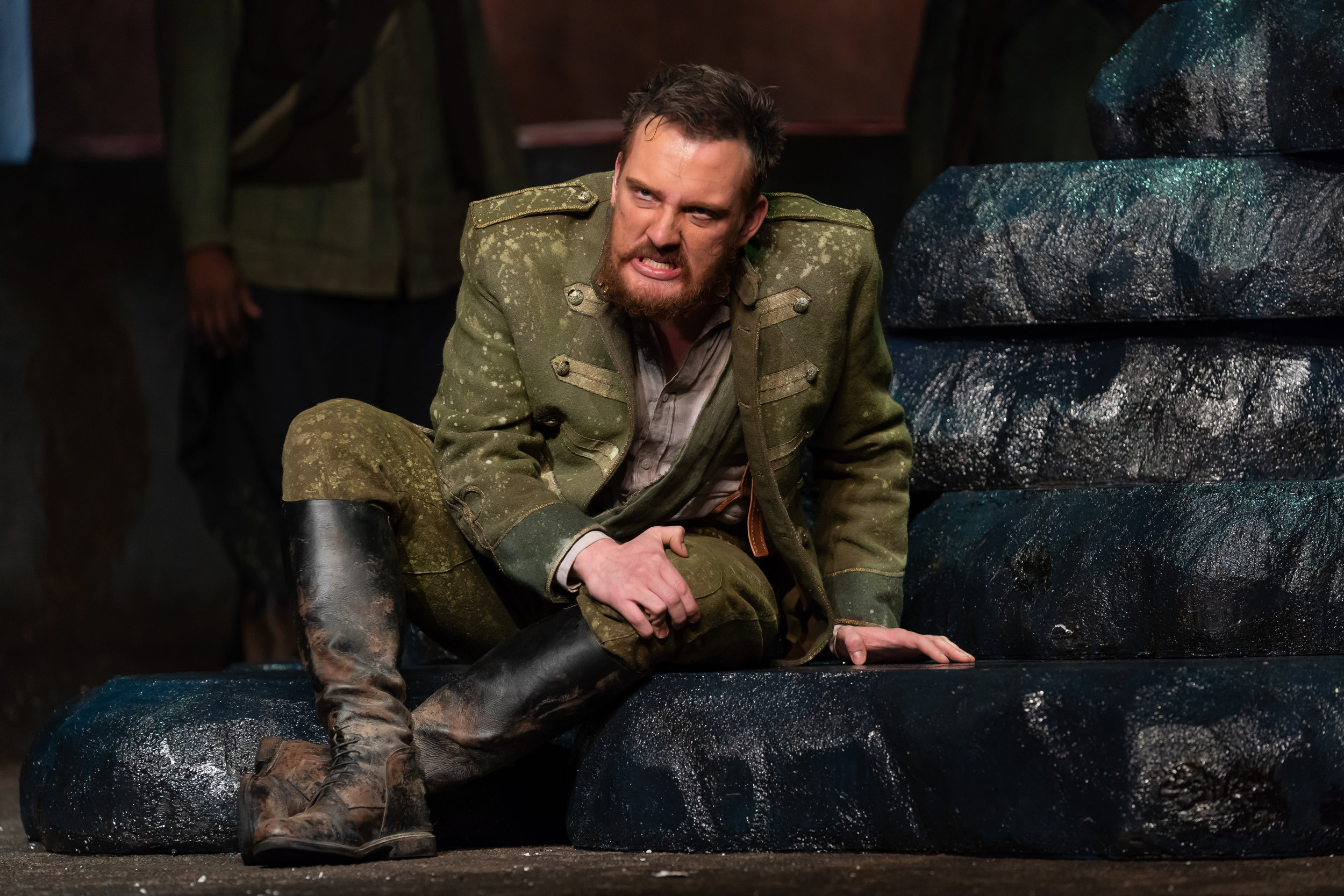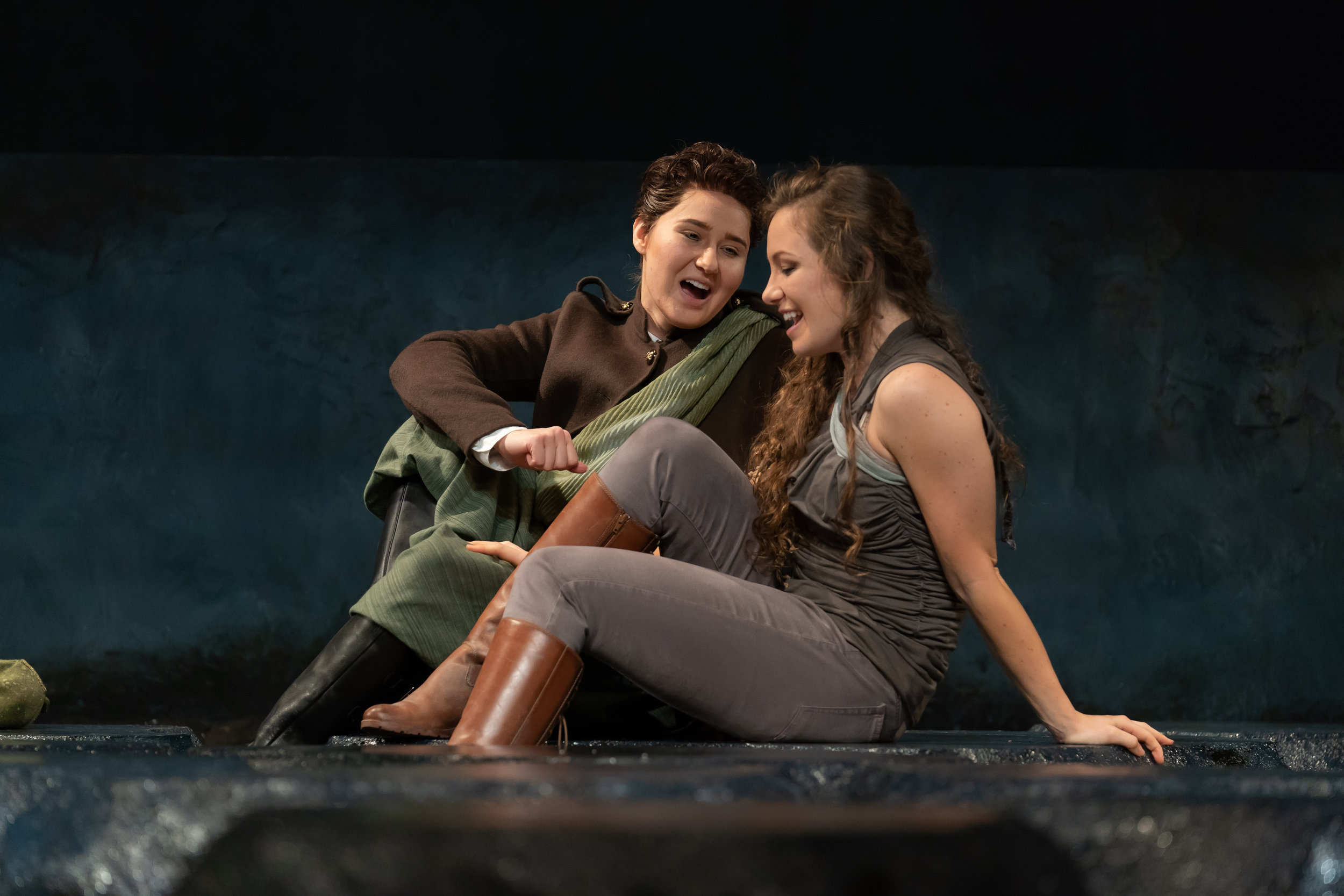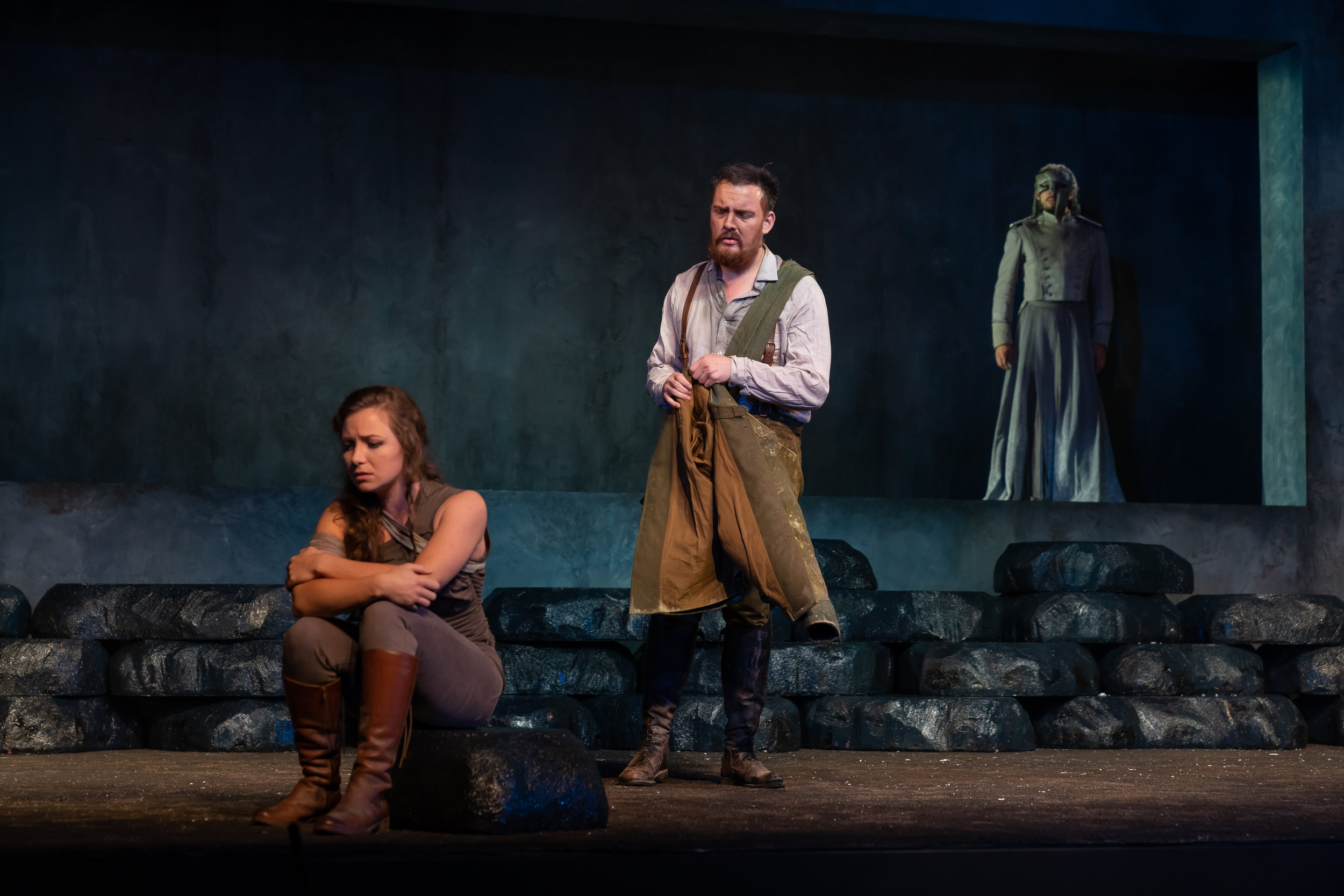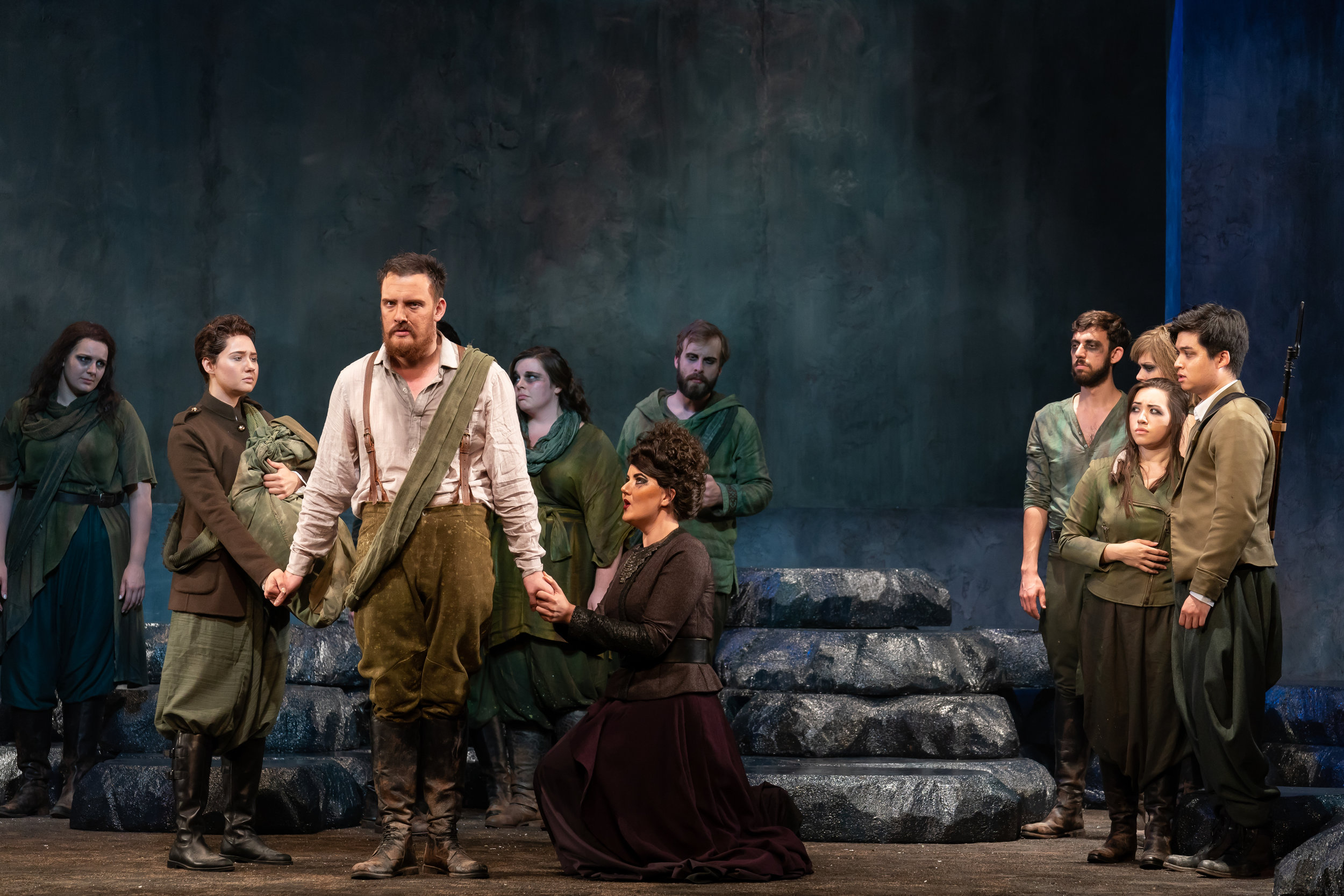Logo courtesy of Wolf Trap Opera
What happens when you pair a composer arriving at greatness with the only Italian poet working in Salzburg during the emergence of the Enlightenment: Idomeneo. In an excellent pre-opera talk Friday night, Wolf Trap Vice President for Opera and Classical Programming, Kim Witman told us that Giambattista Varesco was selected to write the libretto for Idomeneo because Wolfgang Mozart had a commission to write an opera for an important court event, and Mr. Varesco was the only Italian poet in Salzburg at the time. Mozart struggled with Varesco in revising the libretto, eventually publishing it in two forms, Mr. Varesco’s original and Mozart’s revision, which was used for the opera. Despite that struggle and despite having to write arias for contentious singers, Mozart at age 24 managed to make Idomeneo his first operatic masterpiece. Fortunately, the gods intervened and provided him with librettist Lorenzo da Ponte just a few years later, a collaboration that produced his most popular operas (The Marriage of Figaro, Don Giovanni, and Cosi fan tutte); if only da Ponte had been available in 1781.
Ian Koziara as King Idomeneo, then Megan Mikhailovna Samarin as Idamante and Madison Leonard as Princess Ilia. Photos by Scott Suchman; courtesy of Wolf Trap Opera.
It is music not words by which Idomeneo is elevated to greatness. Mozart’s music and arias, and in breaking from the opera seria tradition, a number of ensemble pieces, which no one does better than Mozart, are rated among his best by professional opera critics and musicologists. Idomeneo is a transitional opera with the themes of the eighteenth century's Enlightenment - love, freedom and the rule of reason - overtaking the rules of duty to the monarchy and religion. However, a traditional subject for the plot was required, as was a happy ending, and a sacrifice drama based on Greek legend was chosen. King Idomeneo of Crete returning from fighting in the Trojan War is threatened by a storm at sea; he vows to Neptune that he will make a sacrifice of the first person he encounters in his homeland if his life is spared. After washing ashore, his son Idamante is the first person he sees. The plot is further infused with unrelenting tension because his son has fallen in love with Princess Ilia who was captured in the war and has strong feelings against Idomeneo, and Greek Princess Elletra (known more commonly as Electra) has arrived in Crete, now exiled from her homeland for her role in the killing of her mother Clytemnestra, and she has also fallen in love with Idamante and resents his love for Ilia. These conflicts drive the plot: man against god, love versus duty, and the turmoil of spurned love.
left photo: Madison Leonard as Princess Ilia, Ian Koziara as King Idomeneo, and Cory McGee as A Voice. right photo: Megan Mikhailovna Samarin as Idamante, Ian Koziara as King Idomeneo, and Yelena Dyachek as Elettra. Photos by Scott Suchman; courtesy of Wolf Trap Opera.
While the appeal of Idomeneo is primarily Mozart’s music and arias, the appeal of WTO’s production is the singing of its highly talented Filene and Studio Artists. Each of the major players, Madison Leonard as Ilia, Megan Mikhailovna Samarin in a pants role as Idamante, Yelena Dyachek as Elettra, and Ian Koziara as Idomeneo stood out. Ms. Leonard has a pretty soprano voice and plays her role with convincing tenderness and internal struggle. The transformation of Ms. Samarin, a talented mezzo-soprano, into a young man was remarkable and entirely believable; I thought her voice and acting fit the role beautifully. These players I have heard before. New to me was Ms. Dyachek and immediately I was struck by the power of her voice which ranged in tone from edgy to lovely, though I thought her costume and portrayal of Elletra at times seemed more evil witch than a woman driven to madness. Finally, Mr. Koziara, with a beautiful, enjoyable tenor notable in his first vocal phrase, has already arrived; he gave a strong performance as the tormented King, a man divided against himself, and could as easily command the stage at the Kennedy Center as The Barns. The minor players, Duke Kim as Arbace, Senhica Klee as High Priest, and Cory McGee as The Voice were all excellent. I thought the orchestra played beautifully and the chorus (the Studio Artists playing Trojan and Crete men and women) provided a strong complement to the soloists in bringing Mozart’s music to life.
Megan Mikhailovna as Idamante, Madison Leonard as Princess Ilia, and Ian Koziara as King Idomeneo. Photo by Scott Suchman; courtesy of Wolf Trap Opera.
For me, my emotional involvement in the story never rose very high, try as I might. Mostly I place this on Mr. Varesco's head, not WTO's. Director Omer Ben Seadia sought to emphasize the impact of war on individuals and what they would sacrifice when called on. The men and women of Crete and Troy played by the Studio Artists looked very down trodden, and I was touched by Idamante’s character, his selfless devotion to his father in spite of their long separation. However, my grasp on empathy for a man willing to sacrifice another life for his own was very thin and the role of Elettra in the drama seemed very strained and was left unresolved; she does, however, have some great arias. I suppose my response is odd in a way since I had no problem with the story of Abraham and Isaac or the opera Turandot, both involving human sacrifice; perhaps it is Neptune I have trouble taking seriously and he should play a larger presence in the story. The set for Idomeneo was minimal, grey walls with doors on either side and a large window in the rear, with flat stones arrayed on the stage that were moved around to provide platforms. Not much is needed, but this minimalism left the story to fend for itself, and I thought the story was problematic. The time period of the drama was moved forward from ancient Greece to some unspecified future period; the costumes gave little hint of period or roles. In one scene, Idomeneo lights up a modern looking cigarette as he bemoans his fate, which for me made a human sacrifice drama even harder to accept. I should admit my own prejudice against modernizing traditional operas without special inventiveness and a compelling rationale for doing so, which I didn’t find here. Two aspects of the staging that I thought were quite successful were use of the country people played with enthusiasm by WTO’s Studio Artists and especially the use of a character roaming about in silence linking Ilia to her dead father and the war and who sang the role of A Voice at the end; this invention was very effectively employed.
For this opera fan, the drama and staging did not often enough rise above academic interest that I associate with Greek tragedy, despite the emotions conveyed by the young singers. In fact, it strikes me that Idomeneo might make an excellent concert opera. Viewed on that level, however, the performances of the young singers and hearing great Mozart music make for a highly entertaining evening well worth your time, especially if you haven’t heard Idomeneo before. And there is a happy ending, at least for everyone except Elettra.
The Fan Experience: Additional performances of Idomeneo will take place on Wednesday, June 27, and Saturday, June 30. WTO’s Idomeneo is quite popular and good seats are available but limited. Ticket prices vary by both seating section and date; they range from $36-$80; the cheapest seats have partially obstructed view. The free pre-opera lecture an hour before the performances is highly recommended, especially as an aid to understanding this libretto. The Barns offers food and drink and you can take your drinks to your seat. For many opera venues you will face traffic woes near the theater, expensive parking, and backups to exit the theater parking decks after the performance. Not so with The Barns; this is as stress free as it gets unless you can afford a limo and a driver.






